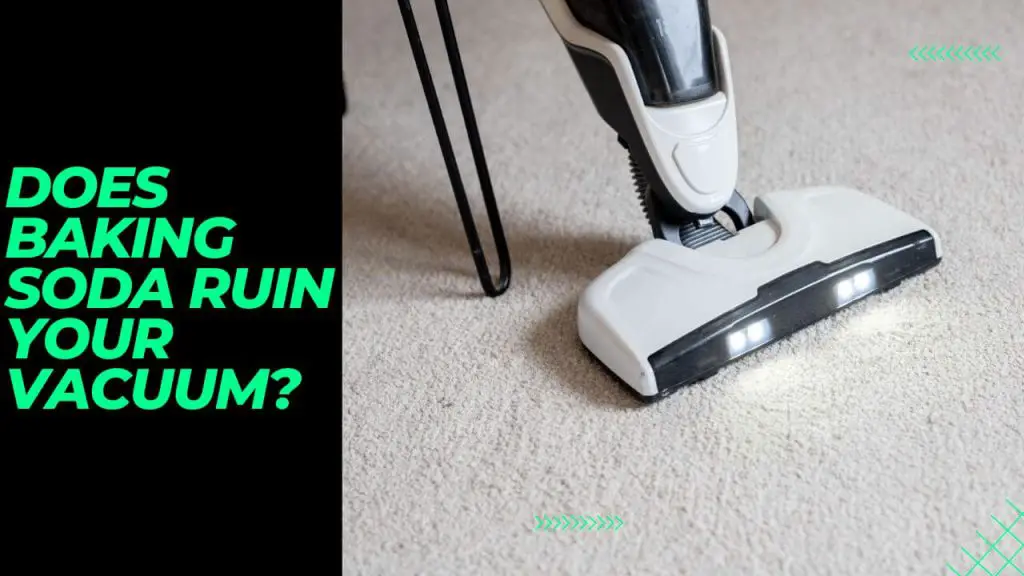If you’ve ever tried to eliminate a pesky odor in your home, you may have heard the suggestion of sprinkling baking soda on your carpets or upholstery and then vacuuming it afterward. But is this a good idea? Does baking soda ruin your vacuum? Let’s take a look at the potential risks of using baking soda in your vacuum cleaner.
Will Baking Soda Damage Your Vacuum Cleaner?
The short answer is no baking soda itself will not damage your vacuum cleaner. That being said, it can cause problems if you don’t use it correctly. For example, if you use too much baking soda at one time, it can clog the filters on your vacuum and reduce its suction power. It could also cause the motor to overheat if too much of the powder gets drawn into the machine.
In addition to potentially damaging your vacuum cleaner, too much baking soda could also irritate allergies or asthma symptoms so it’s important to be careful when using it in your home.
Are There Alternatives to Baking Soda?
Fortunately, there are other alternatives for eliminating odors from carpets and upholstery without using baking soda. Some products are specifically designed to absorb odors from carpets and fabrics without having to be vacuumed up afterward.
These products come in both solid and liquid forms so you can find one that fits your lifestyle and budget. You should also consider investing in an air purifier which can help reduce odors in any room of your home by circulating fresh air throughout the space.
Can you sprinkle baking soda before vacuuming?
Sprinkling baking soda on carpets and upholstery before vacuuming is a popular cleaning technique to absorb odors. While it can be effective, it’s important to use caution. To prevent potential clogging, avoid using excessive amounts of baking soda.
A light sprinkling should suffice for odor absorption, and it will minimize the chances of residue buildup in your vacuum cleaner. Additionally, consider giving the baking soda enough time to work its magic before vacuuming it up. This will allow the particles to settle and reduce the risk of excessive dust becoming airborne during the vacuuming process.
Can you vacuum baking soda with a Dyson?
Dyson is a well-known brand in the vacuum cleaner industry, and many users wonder if their Dyson vacuums are suitable for cleaning up baking soda. While Dyson vacuums are designed to handle a wide range of debris, including fine particles, it’s important to exercise caution when vacuuming baking soda.
The fine texture of baking soda particles can potentially clog Dyson’s advanced filtration system. To minimize the risk, consider using alternative cleaning methods like wiping or sweeping up the baking soda before vacuuming the remaining residue.
Can I put baking soda on the carpet and vacuum it?
Baking soda is often used to help eliminate odors and freshen carpets. Here’s how you can do it:
- Preparation: Ensure that your carpet is clean and free of large debris. If there are any visible stains, treat them before applying baking soda.
- Sprinkle baking soda: Generously sprinkle baking soda over the carpet, focusing on areas with odors or high foot traffic. You can use a sieve or shaker to distribute it evenly.
- Let it sit: Allow the baking soda to sit on the carpet for at least 15-30 minutes. For stronger odors, you can leave it overnight.
- Vacuuming: Use your vacuum cleaner with a clean attachment or a dedicated carpet brush attachment. Vacuum the entire carpet, making sure to go over the areas where the baking soda was applied.
- Repeat if necessary: If there are still lingering odors or if you want to further freshen the carpet, you can repeat the process.
Conclusion:
When used correctly, baking soda can be an effective way of eliminating odors from carpets and fabrics without causing any damage to your vacuum cleaner. However, it’s important to remember that too much baking soda could potentially clog the filters on your machine or cause other issues like reduced suction power or motor overheating.
Fortunately, there are plenty of alternatives out there for reducing household odors that don’t involve using baking soda such as specialty odor absorbers or air purifiers. Ultimately, it’s up to you to decide which method best fits your lifestyle and budget so make sure to do some research before making a decision.
Related Post:
